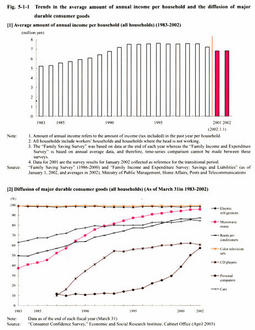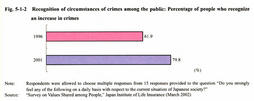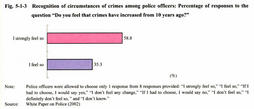| Previous Next Index Image Index Year Selection | |
|
|
Having made a fresh start from the chaos after the war, Japan has accomplished remarkable economic development, and to the present time, just over half a century after the war, Japan has become one of the world's major economic powers. Despite the dark shadow cast by recent recessions, the average economic level of the Japanese people is by no means low in terms of the diffusion of various durable consumer goods and the trend in the amount of annual income per household (see Fig. 5-1-1 ). Furthermore, people are enthusiastic about providing young people with higher education and more than 90% of junior high graduates go to high school. Thus, Japanese society has matured to an advanced stage both in terms of economy and culture, and all Japanese people expected that it would continue to be safe and secure in the future.
However, in contrast to such societal maturity, the circumstances of crimes in Japan have been deteriorating in recent years. The number of reported cases of general penal code offenses (penal code offenses excluding professional negligence in traffic accidents), which include most offenses that harm people's lives, bodies, and property, has increased 1.9-fold in the last 20 years from 1,540,717 (1983) to 2,854,061 (2002), and the number of reported cases per 100,000 capita of population (crime rate) has also increased 1.7-fold from 1,289 (1983) to 2,240 (2002). In particular, since 1996, due to the significant social uncertainties arising from the Great Hanshin/Awaji Earthquake and a number of heinous crimes committed by Aum Shinrikyo cult members, both the number of reported cases and the crime rate have seen a rapid, 1.6-fold increase. Such deteriorating circumstances of crimes are clearly indicated in statistical data and they are also recognized by the public as well as police officers engaged in investigating criminal cases and implementing crime prevention activities. According to the "Opinion Survey on Social Awareness" conducted by the Cabinet Office in December 2002, the percentage of people who mentioned "a high level of public peace" as one of features in which Japanese people can take pride has declined to 26.9%. According to the "Survey on Values Shared among People" conducted by a private research institute, the Japan Institute of Life Insurance, the percentage of people who recognize an increase in crimes has increased from 61.9% in 1996 to 79.8% in 2001. Considering the results of these surveys targeting the public as well as those of another survey conducted by the National Police Agency concerning the recognition of circumstances of crimes among police officers, it is implied that more Japanese people are feeling "insecure" instead of "safe" about public peace in Japan (see Fig. 5-1-2 and Fig. 5-1-3 ). Japanese people may be stunned by the rapid deterioration in the circumstances of crimes in Japan's matured society and they may be feeling increasingly concerned about the deteriorating public security. Such change in public awareness suggests the necessity of taking appropriate measures against the rapidly deteriorating circumstances of crimes. Fig. 5-1-1 Trends in the average amount of annual income per household and the diffusion of major durable consumer goods Fig. 5-1-2 Recognition of circumstances of crimes among the public: Percentage of people who recognize an increase in crimes Fig. 5-1-3 Recognition of circumstances of crimes among police officers: Percentage of responses to the question "Do you feel that crimes have increased from 10 years ago?" |


